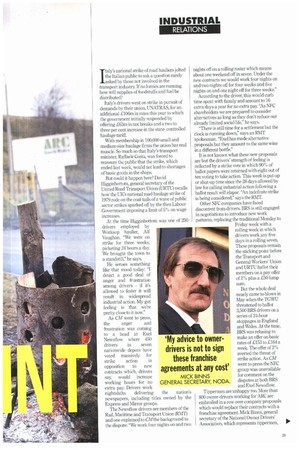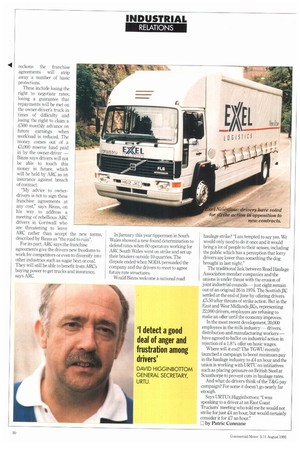INDUSTRIAL
Page 31

Page 32

If you've noticed an error in this article please click here to report it so we can fix it.
RELATIONS
Italy's national strike of road hauliers jolted the Italian public to ask a question rarely asked by those not involved in the transport industry. If no lorries are running how will supplies of foodstuffs and fuel be distributed?
Italy's drivers went on strike in pursuit of demands by their union, UNATRAS, for an additional El 06m in rates this year to which the government initially responded by offering £63m in tax breaks and a two to three per cent increase in the statecontrolled haulage tariff.
With membership in 100,000 small and medium-size haulage firms the union has real muscle. So much so that Italy's transport minister, Raffaele Costa, was forced to reassure the public that the strike, which ended last week, would not lead to shortages of basic goods in the shops.
But could it happen here? David Higginbottom, general secretary of the United Road Transport Union (URTU) recalls how the UK's national road haulage strike of 1979 rode on the coat-tails of a wave of public sector strikes sparked off by the then Labour Government imposing a limit of 5% on wage increases.
At the time Higginbottom was one of 250 drivers employed by Worksop haulier, Alf Vaughan. "We were on strike for three weeks, picketing 24 hours a day. We brought the town to a standstill," he says.
He senses something like that mood today: "I detect a good deal of anger and frustration among drivers if it's allowed to fester it will result in widespread industrial action. My gut feeling is that we're pretty close to it now."
As CM went to press,
the anger and frustration was coming to a head at Exel Newsflow where 450 drivers in seven nationwide depots have voted massively for strike action in opposition to new contracts which, drivers say, would increase working hours for no extra pay. Drivers work nightshifts delivering the nation's newspapers, including titles owned by the Express and Mirror groups.
The Newsflow drivers are members of the Rail, Maritime and Transport Union (RMT) and one explained to CM the background to the dispute: "We work four nights on and two nights off on a rolling roster which means about one weekend off in seven. Under the new contracts we would work four nights on and two nights off for four weeks and five nights on and one night off for three weeks."
According to the driver, this would curb time spent with family and amount to 16 extra days a year for no extra pay. As NFC shareholders we are prepared to consider alternatives as long as they don't reduce our already limited social life," he says.
"There is still time for a settlement but the clock is running down," says an RMT spokesman. "Exel has made alternative proposals but they amount to the same wine in a different bottle."
It is not known what these new proposals are but the drivers' strength of feeling is reflected by a strike vote in which 90% of ballot papers were returned with eight out of ten voting to take action. This week is put-up or shut-up time since the 28 days allowed by law for calling industrial action following a ballot result will elapse. "An indefinite strike is being considered," says the RMT.
Other NFC companies have faced discontent from drivers. BRS is still engaged in negotiations to introduce new work patterns, replacing the traditional Monday to Friday week with a rolling week in which drivers work any five days in a rolling seven. These proposals remain the sticking point before the Transport and General Workers' Union and URTLT ballot their members on a pay offer of 2% plus a .£50 lump sum.
But the whole deal nearly came to blows in May when the TGWU threatened to ballot 3,500 BRS drivers on a series of 24-hour
stoppages in England and Wales. At the time, BRS was refusing to make an offer on basic rates of £153 to £164 a week. The offer of 2% averted the threat of strike action. As CM went to press the NFC group was unavailable for comment on the disputes at both BRS and Exel Newsflow.
Tippermen are unhappy too. More than 800 owner-drivers working for ARC are embroiled in a row over company proposals which would replace their contracts with a franchise agreement. Mick Binns, general secretary of the National Owner Drivers'
Association, which represents tippermen, 1111'
reckons the franchise agreements will strip away a number of basic protections.
These include losing the right to negotiate rates; losing a guarantee that repayments will be met on the owner-driver's truck in times of difficulty and losing the right to claim a 1:500 monthly advance on future earnings when workload is reduced. The money comes out of a £5,000 reserve fund paid in by the owner-driver — Binns says drivers will not be able to touch this money in future, which will be held by ARC as an insurance against breach of contract.
"My advice to ownerdrivers is not to sign these franchise agreements at any cost," says Binns, on his way to address a meeting of rebellious ARC drivers in Cornwall who are threatening to leave ARC rather than accept the new terms, described by Binns as "the road to ruin".
For its part, ARC says the franchise agreements give the drivers new freedoms to work for competitors or even to diversify into other industries such as sugar beet or coal. They will still be able to benefit from ARC's buying power to get trucks and insurance, says ARC. In January this year tippermen in South Wales showed a new-found determination to defend rates when 60 operators working for ARC South Wales went on strike and set up their braziers outside 10 quarries. The dispute ended when NODA persuaded the company and the drivers to meet to agree future rate structures.
Would Binns welcome a national road haulage strike? "I am tempted to say yes. We would only need to do it once and it would bring a lot of people to their senses, including the public which has a perception that lorry drivers are lower than something the dog brought in last night."
The traditional link between Road Haulage Association member companies and the unions is under threat with the erosion of joint industrial councils — just eight remain out of an original 26 in 1976. The Scottish JIC settled at the end of June by offering drivers £5.50 after threats of strike action. But in the East and West Midlands JICs, representing 22,000 drivers, employers are refusing to make an offer until the economy improves.
In the most recent development, 20,000 employees in the milk industry— drivers, distribution and manufacturing workers — have agreed to ballot on industrial action in rejection of a 1.8% offer on basic wages.
Where will it end? The TGWU recently launched a campaign to boost minimum pay in the haulage industry to £4 an hour and the union is working with URTU on intitiatives such as placing pressure on British Steel at Scunthorpe to prevent cuts in haillage rates.
And what do drivers think of the T&G pay campaign? For some it doesn't go nearly far enough.
Says URTU's Higginbottom; "I was speaking to a driver at an East Coast Truckers' meeting who told me he would not strike for just £4 an hour, but would certainly consider it for £7 an hour."
CI by Patric Cunnane












































































